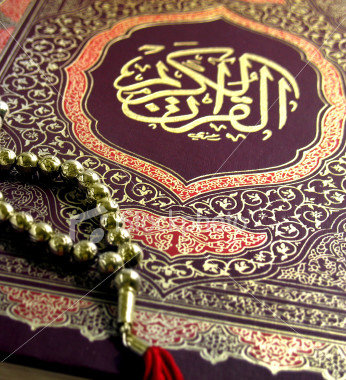Posts Tagged ‘muhammad[pbuh]’
- In: All | Allah الله | Islam | Mohammad | muhammad | Prophet Muhammad [pbuh] | Prophets
- 5 Comments
Muhammad (Peace Be Upon Him): A Role Model for a New Millennium

The human need for role models
Have you ever heard of Moses, Jesus, Confucius, Krishna or the Buddha? How about Gandhi, Mother Theresa or Martin Luther King? If you live in the West, there’s a good chance that you know a bit about these people and their accomplishments. In man’s eternal search for immortality and meaning, many leaders and heroes, both true and false, have made their appearance on the world stage. The respect and reverence shown to such figures among people of every nationality, in every age, points to a deep human need to believe in someone greater than oneself, in an attempt to transcend the confines of one’s own limited existence. We see this theme recur in world myths, legends, hero stories, and in the idealisation of people who have been raised by their followers to superhuman or godly status.
Most educated people today are sceptics, and view such stories as the charming remnants of a simpler age. And with globalisation and the steady stream of new religions and ideologies that people are exposed to, it may be hard to know what to believe. Some find it easier to ignore spiritual questions altogether, focusing instead on their relationships, careers and ‘getting ahead’. Yet we know that excessive materialism stifles the mind and spirit; despite technological advances, the deep yearning to believe in a Higher Power, true leadership, and an ultimate purpose in life remains. In this day and age, who can be trusted as a guide in both spiritual and worldly matters?
There is one leader, still largely unknown to the West, who is an extraordinary role model that people of all backgrounds can relate to: the Prophet Muhammad. The details of Muhammad’s remarkable life have been carefully preserved and have been subjected to the scrutiny of historians, east and west. In contrast to others who have achieved renown for their accomplishments in a limited sphere of activity, Muhammad’s achievements span all major areas of life. The historian Michael H. Hart wrote:
My choice of Muhammad to lead the list of the world’s most influential persons may surprise some readers and be questioned by others, but he was the only man in history who was supremely successful on both the religious and secular levels. Hart, Michael, The 100: A Ranking of the Most Influential Persons in History
Why does the average European or American know so little about a man whose life was so exceptional? Irrational fears and negative propaganda, dating back to the Crusades and exaggerated by the media, have created a ‘mental block’ for many people against all things Arab or Islamic, and the two terms are often mistakenly confused. As we enter the age of the global village, is it not time for those who pride themselves on being unprejudiced, independent thinkers to put aside these mental relics from a bygone era? We invite you to take a few minutes to explore a new understanding of religious leadership, and in so doing, to catch a glimpse of a man who is loved by one-fifth of the people on this planet.
The concept of prophethood in Islam
For a Muslim, a Prophet does not primarily imply someone able to foretell the future – although most of Muhammad’s predictions have already been fulfilled in astonishing ways – but a man sent by God to call people to repent, have faith, and dedicate their lives to doing good, thereby helping them rediscover the purpose for which they were created. Prophets are not considered to be Divine, and are not prayed to or worshipped – though they were men of outstanding character and spirituality who were protected from committing sins, performed miracles, received revelation and communed with God. Islam teaches that God is One, without partner or associate; no human being can share in any of the qualities that are unique to the Intelligent Creator and Sustainer of our vast and complex universe. Muhammad was no more than God’s honoured servant and Messenger, yet he embodied the best of human potential, and that is what continues to make him so appealing and accessible today. Last in a line of Prophets and Messengers sent by God to all people on earth – including Noah, Abraham, Moses and Jesus – who effected the large-scale transformation of individuals and society, Muhammad was unsurpassed as teacher and guide. Speaking of his own role as the last true Prophet before Judgement Day, he said:
‘The parable of me in relation to the Prophets who came before me is that of a man who built a house beautifully and well, except that one brick in its corner was missing. The people went around it and wondered at its beauty, but said: “If only that brick were put in its place!” I am that brick, and I am the last of the Prophets.’
Muhammad’s personal life
Muhammad was born in 570 AD to a noble family of Makkah, and was a descendant of the Prophet Abraham. Orphaned at six, Muhammad was a thoughtful youth who worked as a shepherd and helped his uncle with the trade caravans. As a teenager he rejected the immoral customs of his people, who had become steeped in idolatry, and joined a chivalrous order, earning the nickname ‘The Trustworthy’. At age 25 he found employment with a wealthy widow of 40 named Khadijah, managing her business. Impressed by his honesty and character, Khadijah proposed marriage and he accepted. Despite their age difference, they were happily married for 25 years, and were blessed with six children. After Khadijah’s death Muhammad married several women for political and humanitarian reasons, as was expected of a man of his position; all but one were widows and divorcees. He was a loving and considerate husband and father, and his family was devoted to him despite his voluntary poverty, for he put into practice his own advice, ‘the best of you is the one who is best to his own family.’
Muhammad, the Prophet
Muhammad received his first revelation from God at 40, through the Angel Gabriel. He continued to receive revelations for 23 years, on topics ranging from the Oneness of God and His wondrous handiwork, to stories of earlier prophets, morality and ethics, and life after death. These revelations became collectively known as the Qur’an, and are considered by Muslims to be the literal word of God; the Prophet’s own words were collected separately. Muhammad’s call to monotheism and social reform was heavily opposed by the Makkan elite; after enduring thirteen years of intense persecution, he and his followers were invited to relocate to Madinah, a town to the north that had been torn apart by generations of intertribal warfare. Muhammad successfully settled their differences and forged a bond of brotherhood between the two warring factions, as well as between the locals and the new emigrants. For Arab tribal society, this was an amazing accomplishment. The early Muslims learned to implement the golden rule under the Prophet’s tutelage: ‘No one truly believes until he desires for his brother what he desires for himself.’
Muhammad’s legacy: the Madinan model
For Muhammad, religion was not a matter of personal conviction alone but a complete way of life, and Madinah flourished under his leadership. The Madinan model of government, based on justice, respect for human dignity and God-consciousness, became the template to which Muslims have looked for guidance and inspiration ever since. The Prophet drew up the world’s first constitution in which the rights of religious minorities were protected, and entered into treaties and alliances with neighbouring tribes. He sent letters to the rulers of the Persians, Egyptians, Abyssinians and Byzantines, announcing his message of pure monotheism and inviting them to accept Islam. For the first time in history, women, children, orphans, foreigners and slaves were granted extensive rights and protection. Many of the Prophet’s concerns seem surprisingly ‘modern’: he condemned racism and nationalism, saying ‘there is no superiority of an Arab over a non-Arab, or a white man over a black man, except in righteousness.’ He established laws protecting animals, trees and the environment. He encouraged free trade and ethical investments, but secured workers’ rights and forbade usury. He worked for peace, but defined the parameters of the judicious use of force, when force was needed. He convinced people to give up alcohol, drugs, prostitution and crime, and promoted healthy living. He condemned domestic violence, encouraged his wives to speak their own mind, and granted Muslim women many rights not dreamed of in Europe until centuries later, including the right to own property, reject arranged marriages, and seek divorce because of incompatibility. And the Prophet encouraged his followers to seek beneficial knowledge wherever it could be found, with the result that Muslims never experienced a conflict between science and religion, and led the world in many fields of learning for centuries afterwards. Although his enduring legacy can be observed in everything from art to politics, Muhammad’s greatest achievement by far was to re-establish pure monotheism. As simple and straightforward to understand as the nucleus at the centre of an atom, the concept of One God lies at the heart of Islamic culture. Muslims turn to their Creator for guidance, without the need for intermediaries, or the loss of dignity that idolatry and superstition bring.
The Prophet accomplished all this through the strength of his character and personal example; he inspired in his followers a love, devotion and sense of awe that was unparalleled. While other men would have been corrupted by the absolute power that he wielded in his later years, Muhammad remained humble, ever aware of the Source of his blessings. ‘I am just God’s servant,’ he said, and ‘I have only been sent as a teacher.’ Although he spent his days in serving people and his nights in prayer, he preached religious moderation and balance; he forbade his followers to adopt a monastic lifestyle and preferred that they establish strong families and engage themselves in bettering the world around them, while remaining deeply conscious of God.
In the brief space of one generation and during his own lifetime, the Prophet Muhammad* successfully transformed the faith, mentality and culture of the people of Arabia; within 100 years his message had touched the hearts and lives of millions in Africa, Asia and parts of Europe. The Prophet foretold that each succeeding generation would be worse than the one before it, and true to his prediction, Muslims have not always understood or honoured his example. But Muhammad’s teachings, speeches and customs were carefully noted down by his Companions, and compiled into books of authentic sayings which are available in translation. Along with the Qur’an, they form the holistic foundation of a satisfying way of life for practising Muslims, while for others, they provide a fascinating glimpse into the heart and mind of an exceptional man and role model from whom much can be learned.


 [post this Article on your facebook wall,and share with friends.click above “Share” button …]
[post this Article on your facebook wall,and share with friends.click above “Share” button …]


[where ever you post,please add source link.either in website or even in facebook NOTE…please….spread the link of site..]

![]() Note:I’d love to see who visit my website,your views about website. Click here to leave your feedback.
Note:I’d love to see who visit my website,your views about website. Click here to leave your feedback.

Why Did the Prophet PBUH Had So Many Wives?
Other Prophets Practiced Polygamy
The fact that only Muhammad (peace and blessings be upon him) is accused of polygamy is rather surprising, since this is a privilege enjoyed by prophets before him. Their wives and concubines came in great numbers, too! The Torah, the Bible, and the Qur’an tell of some of them; the rest are not mentioned so we don’t know, but among the ones who were polygamous we can count Prophets Ibrahim (Abraham), Ya`qub (Jacob), Dawud (David), and Sulayman (Solomon). The Scriptures talk of polygamy as a “favor” bestowed upon them from the Lord.
First Kings 11:1-3 indicates that King Solomon had 700 hundred wives and 300 hundred concubines! In sealing treaties in ancient days, it was customary for a lesser king to give his daughter in marriage to the greater king. Every time a new treaty was sealed, Solomon ended up with yet another wife. These wives were considered “tokens of friendship” and “sealed” the relationship between the two kings. (Reasoning from the Scriptures on 1 Kings)
Scripture indicates that David also acquired wives and concubines, David’s blessings, including his wives, were given to him as a result of God’s favor (2 Sam. 5:12-13; 12:8; D & C 132:39). Scriptural records say that the Lord did command some of his ancient saints to practice plural marriage. Abraham, Isaac, and Jacob—among others (D & C 132)—conformed to this ennobling and exalting principle; the whole history of ancient Israel was one in which plurality of wives was a divinely accepted and approved order of matrimony. Those who entered this order at the Lord’s command, and who kept the laws and conditions appertaining to it, have gained for themselves eternal exaltation in the highest heaven of the celestial world. (Mormon Doctrine of Plural Marriage p. 578)
Islam Didn’t Invent Polygamy but Only Regulated It—in Favor of Women!
From the above accounts, we can clearly see that Prophets—including Muhammad—were allowed to be more polygamous than their followers, not just for carnal reasons, but for political and religious reasons pertaining to their call. Consequently, it is groundless to wonder why Muslims can’t marry 12 wives like their prophet, just as it is groundless to wonder why Jews and Christians can’t marry 700 like theirs! Islam didn’t invent polygamy; Islam only made polygamy more humane, instituting equal rights for all wives. And even so, Muslim women are not forced to accept this and may put a condition against it in their marriage contract.
The Qur’an Is the Only Holy Book That Actually Says “Marry Only One”
Images of “sheikhs with harems” are not consistent with Islam, as, in fact, the general rule in Islam is monogamy not polygamy. the Qur’an says what means:
*{Marry women of your choice, two, or three, or four; but if ye fear that ye shall not be able to deal justly (with them), then only one.}* (An-Nisaa’ 3:3)
Polygamy in Islam is not recommended; it is only permitted under certain guidelines. Permission to practice polygamy is not associated with mere satisfaction of passion. It is, rather, associated withcompassion toward widows and orphans.
Before the Qur’an was revealed, there was no upper limit for polygamy, and many men had more than four wives. Islam put an upper limit of four wives, permitting a man to marry more than once, only on the condition that he deal justly with all of them. Yet the same verse points out:
*{Ye are never able to be fair and just as between women}* (Al-Nisaa’ 3:129)
Therefore polygamy is not a rule but an exception.
Why Is the Exception of Polygamy Allowed in Islam?
The exception is made for many reasons, but let’s note only one here, addressing your concern that Muhammad (peace and blessings be upon him) “had intercourse outside of wedlock.”
In Western society, it is common for a man to have mistresses or multiple extra-marital affairs. Women in this case are degraded to mere sex objects with absolutely no rights; they’re usually on the losing end of such liaisons. The same society, however, cannot accept a man having more than one wife so that women can retain their lawful rights and lead an honorable, dignified, and respectable life.
If every adult American man married only one woman, there would still be more than 25 million women in the United States who would not be able to get husbands, at least considering that—according to latest statistics—10 percent of the American population is gay! That’s close to 30 million people!
Thus the only option for a woman who cannot find a husband is either to marry a married man or to become “public property.” Islam gives women the honorable position by permitting the first option and disallowing the second. At least one of the reasons Islam has permitted limited polygamy is to protect the modesty of women!
Islam’s Straightforward Approach in Problem Solving
In Islam, problems are supposed to be faced and solved—not ignored! So, rather than requiring hypocritical compliance, Islam provides legitimate and clean solutions to the problems of individuals and societies. There is no doubt that the second wife legally married and treated kindly is better off than a mistress without any legal rights. Through practical example, Prophet Muhammad (peace and blessings be upon him) as the guide of Muslims has set the applicable rules for this aspect of human relations in order not to leave anything for speculation.
Stages of the Prophet’s (peace and blessings be upon him) Married Life
First, let’s remember that Prophet Muhammad (peace and blessings be upon him) led a life supported only by the bare minimum of necessities. His wives were not idly wasting away the hours in a luxurious harem but led a life of labor and sacrifice, while he was mostly busy away from home overseeing his numerous duties as a Prophet. So, obviously, lust was not a factor, as he wasn’t even at home most of the time. Further, most of his marriages occurred at an age when lust is not a major factor in any man’s life:
1. He remained single until age 25.
2. From age 25 to 50 he was faithful to only one wife, Khadijah, who bore all his children except one. She was 15 years older than him, with children from two previous marriages. She was his greatest ally when he received the Call at age 40 until she died when he was 50 years old. He remained in love with her until he died and often talked of his life with her with great nostalgia.
3. Between ages 50 and 52 he remained unmarried and mourning his late beloved wife. He lived alone with his daughters.
4. Between ages 53 and 60 he married all his other wives for many noble reasons detailed below. It’s unimaginable for a man to suddenly turn lustful at this age, especially as he was constantly traveling, with bloodthirsty enemies on his heels.
5. At age 60, Allah revealed to him verse preventing him from marrying any more until he died, which was at age 63. The Qur’an says what means:
*{It is not lawful for you (to marry other) women after this, nor to change them for other wives.}* (Al-Ahzab 33:52)
Reasons for the Prophet’s Marriages
We can categorize all his marriages under two aspects of his personality:
– Muhammad the man who needed a loving wife, children, and a stable home, so he married Khadijah and remained with only her for 20 years until she died.
– Muhammad the Prophet who married the other wives for reasons pertaining to his duty to deliver the Message to the world. Those particular women were carefully selected, not just haphazardly “acquired” for carnal reasons, as suggested. Here are some of the reasons for which Muhammad married:
1. To pass on Islam to the next generations as a practical legacy
Prophet Muhammad is the only prophet without any privacy, and with a meticulously preserved tradition in speech and actions in all minute details of his public and private life. Preserved in the sharp minds of his wives and his Companions, those narrations comprise the “daily life manual” for Muslims to follow until the end of time. The fact that Islam was spread on the shoulders of women and preserved in their hearts is a great honor to the females of this Ummah. The books of authentic Hadith attribute more than 3,000 narrations and Prophetic traditions to his wives alone.
2. To cement the relations of the budding nation
In a tribal society, it was customary to seal treaties through marrying into tribes. Muhammad’s closest Companions later became the four caliphs who led Islam at the critical stage after his death. Two of them were the fathers of his wives `A’ishah (daughter of Abu Bakr) and Hafsa (daughter of `Umar); the other two married his daughters (`Uthman married Ruqayyah and Zaynab in succession, and `Ali married Fatimah).
3. To teach Muslims compassion with women
He taught them to be compassionate not just to the young and beautiful maidens, but more so to the weak and destitute widows, divorcees, orphans, and elderly women. Islam teaches that women are to be respected, protected, and cared for by their men folk. They’re not to be cast out to face a harsh life alone while able men around them just pity them and do nothing to help, or worse, use their weakness to take them as mistresses!
4. To offer a practical role model to Muslims until the end of time
Although many believing women often approached Muhammad offering him themselves in marriage, he politely turned down their offers. Most of his wives after the death of Khadijah were old, devoid of beauty, and previously married, except `A’ishah, who was the only young virgin. He married from other nations and religions; some were the daughters of his worst enemies, and his marriage to one woman won all her people into Islam. Regardless of his neutral feelings towards many of them, he was a model example of equal justice and kindness to them all, and he would never discriminate among them.
Who Were the Prophet’s Wives?
Prophet Muhammad (peace and blessings be upon him) married 12 wives in his life. When he died he had 9 wives. They have a very special status in the hearts of Muslims as the “Mothers of the Believers,” as the Qur’an instructs, and they are the source of a great amount of wisdom which they learned while living close to such a great man. Perhaps you’d like to research a bit to find their beautiful stories, so here are their names: Khadijah bint Khuwaylid, Sawdah bint Zam’ah, `A’ishah bint Abi Bakr, Hafsah bint `Umar ibn Al-Khattab, Zaynab bint Khuzaymah, Umm Salama, Zaynab bint Jahsh, Juwayriah bint Al-Harith, Umm Habibah, Safiyah bint Huyay ibn Akhtab, Maymunah bint Al-Harith, Maria the Copt.
Can We Consider His Marriage to `A’ishah a Case of Child Molestation?
To answer your speculation, let’s continue our objective trip into the past. Obviously, when traveling back in time 1400 years to examine a lifestyle we never witnessed, it is unfair to apply our present day standards, so let’s listen to the experts. Authentic historical records prove that the social traditions of the time and place—regardless of religion—considered Arab females as women as soon as their menstrual cycles began. The custom was to give daughters in marriage at that age. This was practiced by all dwellers in Arabia before Islam: pagans, disbelievers, Jews, and others. It’s a fact that female menstruation in hot climates starts much earlier than in cold climates, so females in Arabia matured as early as 8 or 9; they also aged earlier than other women.
It’s a neglected fact that before she was married to Muhammad, `A’ishah had been engaged to an infidel, Jubair ibn Mus’ab ibn Ady. Her fiancé broke the engagement on the basis of religious difference. So her father, Abu Bakr, agreed to give her hand in marriage to the Prophet.
The Great Wisdom in Selecting `A’ishah in Particular as a Young Wife
`A’ishah (may Allah be pleased with her) came from a house famous for learning and memorizing great quantities of knowledge; her father was a live encyclopedia of Arab tribal pedigrees and poetry. She inherited his ability, and in her young, intelligent, receptive mind, she preserved a precious portion of Islam she learned during seven years of marriage, for 47 years after the death of the Prophet (peace and blessings be upon him) and she taught thousands of men worldwide their religion as she had learned it firsthand from the Prophet. To our present day, she is considered among the most prominent Islamic scholars, and she holds extremely high esteem in the hearts of all Muslims as such and as “the beloved of the Prophet,” who often mentioned her as the human he loved the most on the face of this earth. With her, he built a model Muslim home for Muslims to strive to imitate forever. For More details Click the following Links :
Why Prophet Muhammad Peace be upon him Married Aysha?
Was Prophet Muhammad Peace Be Upon Him a PEDOPHILE? Naudibillah!
Was Maria the Copt a Slave, a Concubine, or a Wife of the Prophet?
Slavery already existed long before Islam. It was a system whereby a human captured in wars or kidnapped could be sold as a “possession.” That term applied to both sexes, not to women only. In some cultures slaves were considered subhuman and treated brutally. In Europe, for example, Romans threw Christian slaves to the lions while the public cheered; female slaves were thought to have no souls and were tortured mercilessly; slaves lived in degrading conditions; both sexes were forced to offer sexual favors to their masters; and as “possessions” they had no choice, no will, and no rights.
Islam recognized the human rights of slaves and encouraged Muslims to set slaves free. Islam prohibited adultery and homosexuality, and prevented forcing female slaves into sexual acts against their will. Islam encouraged educating them, setting them free, then legally marrying them and giving them their moral and financial rights. The reward for this—as mentioned in Prophetic Hadith—is eternal residence in Paradise.
Maria (may Allah be pleased with her) was not a concubine; she was a slave owned by Egypt’s Christian governor, who offered her and her sister Serine—among other presents—as a “gift of good will” to the Prophet in reply to his envoys inviting him to Islam. On her way from Egypt to Madinah, she was curious to learn about “her new master” and listened to his Companions talk about him. As a result, she became Muslim before meeting Muhammad. Scholars’ opinions vary of her status afterwards; here is the opinion I support:
One of the prominent Al-Azhar scholars, Sheikh Abdul Majid Subh, states:
“Prophet Muhammad (peace and blessings be upon him), instead of taking concubines, entered into lawful marriages based on reason and wisdom. Maria the Copt was given to him as a present, but rather than taking her as a concubine, the Prophet (peace and blessings be upon him) married her, thus elevating her status by marriage.”
Women’s Rights in Islam Surpass Modern Systems
If women in the Muslim World today don’t have their rights, it is not because Islam didn’t give them rights. Alien traditions have overshadowed the teachings of Islam, either through ignorance or the impact of colonialism. Most of the so-called modern reforms in the status of women appeared after the West abandoned religion for secularism. Those in the West who claim to follow the Judeo-Christian tradition really follow the values of Western liberalism.
In England and America less than fifty years ago, a woman could not buy a house or car without the co-signature of a male “guardian”! In Contrast, Islamic Law guaranteed rights to women over 1400 years ago that were unheard of in the West until the 1900s.
Numerous verses of the Qur’an state that men and women are equal in the site of Allah; the only thing that distinguishes people in His site is their level of God-consciousness.
Islam teaches that a woman is a full person under the law, and is the spiritual equal of a male. Women have the right to own property, to operate a business, and to receive equal pay for equal work. Women are allowed total control of their wealth. They cannot be married against their will, and they are allowed to keep their own name when married. They have the right to inherit property and to have their marriage dissolved in the case of neglect or mistreatment. Islam does not consider woman an “evil temptress,” and thus does not blame woman for Original Sin (a doctrine that Islam rejects). Women in Islam participate in all forms of worship that men participate in.
Prophet Muhammad’s mission stopped many of the horrible practices against women that were present in the society of his time. He actually harnessed the unrestricted polygamy of the Arabs of the time, and put many laws in place to protect the well-being of women. In his Farewell Sermon just weeks before his death, he summarized the teachings of Islam to the believers in a final farewell. His last words were “Be kind to women!”


 [post this Article on your facebook wall,and share with friends.click above “Share” button …]
[post this Article on your facebook wall,and share with friends.click above “Share” button …]


[where ever you post,please add source link.either in website or even in facebook NOTE…please….spread the link of site..]

![]() Note:I’d love to see who visit my website,your views about website. Click here to leave your feedback.
Note:I’d love to see who visit my website,your views about website. Click here to leave your feedback.

Are we hypocritical lovers of Prophet??

The concept of the religion of Islam is to abide by the book of ALLAH i.e. Quran and follow the way of life (Sunnah) of prophet. Life of Prophet Muhammad (pbuh) was the realistic example of ALLAH’s words i.e. Quran. So perfect was the model that which Muhammad presented, it encompassed all the components of human life to perfection beyond compare. He was an orphan; hardworking shepherd; obedient son; sacrificing nephew; loving and concerned father; compassionate grandfather; devoted husband; noble citizen; courteous neighbor; honest tradesman; trustworthy individual; guardian of orphans and widows; messiah of down-trodden; tolerant preacher never offending belief of others; true social reformer and abolisher of injustice of any kind; pioneer of freedom and equality; merciful forgiver; able and just ruler; advocator of best treatment to one and all especially non believers who come under protection; and the first human to give women equal status in society and the right of full possession of property and inheritance from parents, sons, brothers and sisters and so on. An exemplary visionary who relentlessly worked to bring the mankind close to his creator (ALLAH) thereby on a common platform rising above, religion, sex, cast, creed, colour, race, social status, etc.
Who can better pursue the philosophy of Prophet than his own companions as they witnessed him practicing perfectly what he preached. They were never impolite or offensive. They respected and honored him more than themselves. Let me quote an example of a companion, Khubaib (may ALLAH be pleased with him) at the last minute of his life, the pagans asked him: “Don’t you wish that you were spared and Muhammad PBUH got this punishment? Would you not like that you were resting comfortably in your home, while he was killed in your place?” From the man who was about to die because he had accepted the Message brought by Muhammad PBUH came with this reply:
“By ALLAH, I cannot even imagine that a thorn should prick the foot of Muhammad PBUH while I rest in my home.”
On the occasion of treaty of Hudaibia, Quraish (the Prophet’s tribe) sent Orwa Ibn Masud to negotiate with the Prophet in the Hudaibia area; he was greatly impressed by how the companions treated the Prophet. He said,
“I have visited the kings of Persia, Rome and Abysinia, but I have not seen any leader more revered and respected by his people than Muhammad. If he ordered them to do anything, they do it without delay. If he performs Wudhu (washing up for prayer) they all seek the remainder of the water he used. They never look at him in the eye, out of respect.”
This is how the Prophet was treated by his companions. He was ALLAH’s Messenger who possessed great qualities and the best of conduct ever.
There are three signs which indicate that a person has tasted the sweetness of faith.
1) That he loves ALLAH and His Prophet more than anything else.
2) He loves everyone solely for the sake of ALLAH.
3) After accepting Islam he hates going back to non-belief as much as he hates going into the fire.” [Bukhari and Muslim].
This kind of incredible relationship with the prophet has to be for two reasons
• Because he is the core of the entire religion
• Because he has set examples for us not just for admiration but emulation.
What is the relation of an average metropolitan Muslim and prophet? We no doubt adore our beloved Prophet Muhammad, to whom we even desire to sacrifice our lives. However, it is a real pity that our minds are corrupted and we are subjugated by the external environment. If we really love our Prophet, we should have followed him by abstaining from the things he ostracized. The Sunnah is diminishing from our lives, our actions are way beyond what Muhammad (pbuh) had envisaged for his treasured ummah.
Islam is a perfect religion and every solution to any problem is described in the Holy Quran and very evidently practiced by Prophet Muhammad. In the context of blasphemy against our prophet, our brothers rightly protested, banned products, and few laid downed their lives. Let us analyze how our Prophet responded to mischief mongers and evil doers. Everyone is aware of the narrative about the woman, who always put her garbage on the road whenever Prophet Muhammad was passing. Frankly, I was upset when I first listened to such incidence. But later, as a Muslim, I reasoned that I have to do what Prophet did. i.e. follow him. My Prophet never uttered a word to the woman, just moved on with a smile. Later on when she fell sick, the Prophet was the first to visit her in spite of her behaviour. This very gesture moved her heart and she embraced Islam.
Recall the event at Taif, when the Prophet was stoned. The angel Jibrael AS appeared and offered to crush the people between the two mountains, but still, even in that condition, the Prophet cared about the people and replied:
‘No, I hope that these people will one day come to worship only Allah and Him alone’?
and did not let angel do so. Soon the Taif’s offspring’s entered into realm of Islam.
In this world, there are still millions of people who are living in darkness and ignorance. It becomes gravely important to enlighten the mass (by dawah) to the message of our Prophet in best possible manner. The use of social networking sites and internet will largely support this cause. Facebook has provided us a medium to interact with everyone throughout the world and where the Prophet is being criticized, it is like a blessing in disguise for us. As every non-Muslim there in, is putting forward his perspective. We ought to answer them and clear their misconception appropriately accompanied with logical facts.
Hence, I request Muslims to broaden their horizon of thought and actions. Work earnestly to become better Muslims by incorporating values of Sunnah. Seek an opportunity in every adversity to spread the message of Muhammad to those who criticize Islam. Verily ALLAH knows our intentions and actions are well judged. Expect nothing but HIS appeasement alone!


 [post this Article on your facebook wall,and share with friends.click above “Share” button …]
[post this Article on your facebook wall,and share with friends.click above “Share” button …]


[where ever you post,please add source link.either in website or even in facebook NOTE…please….spread the link of site..]

![]() Note:I’d love to see who visit my website,your views about website. Click here to leave your feedback.
Note:I’d love to see who visit my website,your views about website. Click here to leave your feedback.




 A long time ago, in a land far, far away, there lived an old woman who was carrying a heavy load along the road in the desert. It was a bit difficult for her, but she was managing as best as she could. A young man asked if he could help her with her load, and she readily obliged. Here is the conversation that transpired:
A long time ago, in a land far, far away, there lived an old woman who was carrying a heavy load along the road in the desert. It was a bit difficult for her, but she was managing as best as she could. A young man asked if he could help her with her load, and she readily obliged. Here is the conversation that transpired:








































 Oh Allah,Please Forgive me
Oh Allah,Please Forgive me Ex-Christians-Now Muslim,Alhamdulillah
Ex-Christians-Now Muslim,Alhamdulillah I Love My Prophet Muhammad s.a.w
I Love My Prophet Muhammad s.a.w
















![Fake Grave of Prophet Muhammad [pbuh]](https://islamgreatreligion.files.wordpress.com/2009/07/prophet_muhammad_pbuh_tomb4.jpg)


















Recent Comments